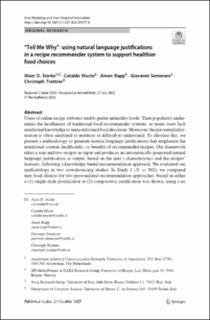| dc.contributor.author | Starke, Alain Dominique | |
| dc.contributor.author | Musto, Cataldo | |
| dc.contributor.author | Rapp, Amon | |
| dc.contributor.author | Semeraro, Giovanni | |
| dc.contributor.author | Trattner, Christoph | |
| dc.date.accessioned | 2024-02-13T13:11:31Z | |
| dc.date.available | 2024-02-13T13:11:31Z | |
| dc.date.created | 2023-10-26T08:44:18Z | |
| dc.date.issued | 2023 | |
| dc.identifier.issn | 0924-1868 | |
| dc.identifier.uri | https://hdl.handle.net/11250/3117321 | |
| dc.description.abstract | Users of online recipe websites tend to prefer unhealthy foods. Their popularity under- mines the healthiness of traditional food recommender systems, as many users lack nutritional knowledge to make informed food decisions. Moreover, the presented infor- mation is often unrelated to nutrition or difficult to understand. To alleviate this, we present a methodology to generate natural language justifications that emphasize the nutritional content, health risks, or benefits of recommended recipes. Our framework takes a user and two recipes as input and produces an automatically generated natural language justification as output, based on the user’s characteristics and the recipes’ features, following a knowledge-based recommendation approach. We evaluated our methodology in two crowdsourcing studies. In Study 1 (N = 502), we compared user food choices for two personalized recommendation approaches, based on either a (1) single-style justification or (2) comparative justification was shown, using a no justification baseline. The recommendations were either popularity-based or health- aware, the latter based on the health and nutritional needs of the user. We found that comparative justification styles were effective in supporting choices for our health- aware recommendations, confirming the impact of our methodology on food choices. In Study 2 (N = 504), we used the same methodology to compare the effectiveness of eight different comparative justification strategies. We presented pairs of recipes twice to users: once without and once with a pairwise justification. Results indicated that justifications led to significantly healthier choices for first course meals, while strategies that compared food features and emphasized health risks, benefits, and a user’s lifestyle were most effective, catering to health-related choice motivations. | en_US |
| dc.language.iso | eng | en_US |
| dc.publisher | Springer | en_US |
| dc.rights | Navngivelse 4.0 Internasjonal | * |
| dc.rights.uri | http://creativecommons.org/licenses/by/4.0/deed.no | * |
| dc.title | “Tell Me Why”: using natural language justifications in a recipe recommender system to support healthier food choices | en_US |
| dc.type | Journal article | en_US |
| dc.type | Peer reviewed | en_US |
| dc.description.version | publishedVersion | en_US |
| dc.rights.holder | Copyright 2023 The Author(s) | en_US |
| cristin.ispublished | true | |
| cristin.fulltext | original | |
| cristin.qualitycode | 2 | |
| dc.identifier.doi | 10.1007/s11257-023-09377-8 | |
| dc.identifier.cristin | 2188600 | |
| dc.source.journal | User modeling and user-adapted interaction | en_US |
| dc.relation.project | Norges forskningsråd: 309339 | en_US |
| dc.identifier.citation | User modeling and user-adapted interaction. 2023. | en_US |

